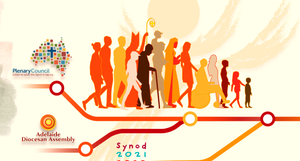01 Mar 2022
What’s in it for us?
The Southern Cross March 2022

Sometimes we humans make decisions based solely on the principle of ‘What’s in it for me?’
Before deciding to contribute to something, sometimes there is a subtle calculus we apply to see, well, ‘what’s in it for me?’. This is not surprising in some ways as it is part of that self-preservation element to our lives.
Yet the way of the disciple actually teaches us to ask a slightly different question, ‘what’s in it for us?’ It is not always easy to break away from that first question, but it is important if we are not simply to live in a bubble but as a genuine human and Christian society.
As the State election looms on the feast of St Joseph, March 19, and followed not long after by a Federal election, this is an important question for all of us to ask. ‘What’s in it for us?’
This question takes us one step away from a purely selfish way of looking at things and seeks to find out what the common good is. While we may be subtly conditioned in our society to simply ask, ‘what’s in it for me?’, asking the further question, ‘what’s in it for us?’, actually is the harder and more important question.
I ask you to consider when you come to vote to think of this second question. To consider the common good, not just my good; to consider a broad range of issues that are important, not simply one issue.
Yes the world is complex at times. Yet putting the common good first helps to untangle that complexity a little because we put God at the centre of all that we are and not ourselves, and we do it together.
The synodal journey
Talking with some people after Mass recently, they expressed a sense of being ‘over consulted’ and ‘consultation fatigue’. They joked that we went from a time in the Church when we were asked about nothing, told to, in their words, ‘pay, pray and obey’, to a time more recently when we seem to be asked our opinion every other day about something.
It’s true we have entered into a different mode of being the Church, and yet it is an ancient mode, and authentic mode. Some seem a little sceptical because this appears new or as if we are ‘imitating the failures of other churches’. A short look at the history of the Church sees that both of these statements are not true. This is an authentic expression of our Catholic faith.
Where we might get into trouble is if we think it is simply about being consulted. After the consultation of the Church in Australia, after the consultation of our Diocese in 2021, we have a wonderful repertoire of ideas and hopes, and at times fears of what people hold in their hearts.
It is what we do with those hopes and fears that is important, hence the synodal journey. This simply means that we journey together. It is relearning, at times, a forgotten art. We have no further to look than our Eastern sisters and brothers in the Eparchies for how this works.
We drown in information today. What was so brilliant about the consultation and discernment phases of the Plenary Council and our own Diocesan Assembly was the role of discernment and asking that vital question, ‘What do you think God is asking of Australia at this time?’.
If we are not still asking that question then we might be a little bit stuck on that previous question, ‘What’s in it for me?’. While not a bad question, it is inadequate. We need the ‘What’s in it for us?’ so continuing to ask ‘What do you think God is asking of Australia at this time?’ is vital.
I hear all sorts of people telling me what is wrong with the Church. It is easy to say what is wrong but when I remind them of the question that began our journey to the Plenary Council ‘What do you think God is asking of Australia at this time?’ generally they become a little more nuanced, and most honestly say that they haven’t been listening as much to God.
This year with the launch of the Diocesan Pastoral Council and other initiatives from our Archdiocese, the synodal path and journey again comes front and centre into our Diocesan focus. It has always been there; time, after a breather, makes it more explicit, especially as we engage in the whole-of-Church preparation for the synod in 2023.
We, thanks be to God, have actually travelled a long way along this synodal path. After all that consultation and the positive experiences of our first Diocesan Assembly in September, the first session of the Plenary Council in October last year, lessons are being learned, hope rekindled. All this during the difficult time of COVID.
Let us talk more about it; explore what it might mean in our parish or community, our school, in the domestic Church, the family and with our young people.
One more thing
Last month I challenged each of us to pray a psalm each day. How might we be going with that challenge?
One of our seminary lecturers began every lecture with Psalm 130. It is worth committing to memory.
O Lord, my heart is not proud
nor haughty my eyes.
I have not gone after things too great
nor marvels beyond me.
Truly I have set my soul
in silence and peace.
A weaned child on its mother’s breast,
even so is my soul.
O Israel, hope in the Lord
both now and for ever.
God is good. Good indeed.
